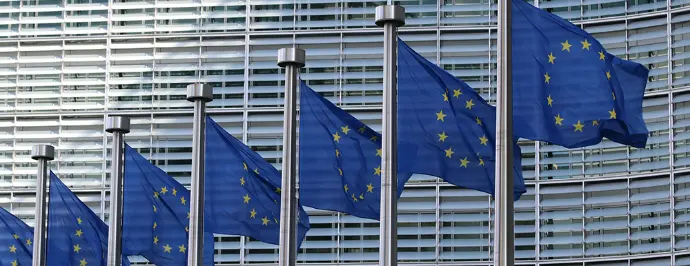In the previous blog, 'Digital Sovereignty: What's The Fuss About?', you learn about the basics of Digital Sovereignty itself.

Three years ago, no one was talking about "digital sovereignty" and now it seems the term is popping up everywhere.
This isn't a coincidence or a sudden trend, but the result of a convergence of geopolitical, legal and technological developments that have gained momentum in recent years.
European vs. Non-European Cybersecurity Vendors
The competitive landscape in cybersecurity is shifting and with it, the strategic importance of supplier origin.
The Role of European Cybersecurity Suppliers
European cybersecurity vendors are uniquely positioned to enable true digital sovereignty. Their role is multifaceted:

- Technological Excellence: They must deliver products and services that match or exceed the capabilities of the world’s leading cybersecurity providers.
- Legal Compliance Within the EU: By keeping data and processes, such as threat intelligence analysis and sandboxing, within EU jurisdiction, they remain outside the reach of foreign laws like the U.S. CLOUD Act.
- Regional Expertise: They often possess a deep knowledge of the European threat landscape, regulatory environment and industry-specific needs.
- Transparency and Trust: By providing complete visibility into their technology, development processes and data flows, they can build confidence.
How Non-European Suppliers Should Respond
Non-European suppliers cannot afford to dismiss Europe’s push for digital sovereignty. To remain competitive and trusted in the EU market, they must:
- Invest in Sovereign Clouds: Build and operate data centers within the EU, with legal guarantees that all data stored there remains fully under European jurisdiction. While companies like Microsoft and Google have made strides in this direction, their initiatives remain incomplete, and true sovereignty has not yet been achieved.
- Demonstrate Compliance: Full, verifiable adherence to GDPR, NIS2 and other EU regulations is the absolute baseline for market acceptance.
- Form Strategic Partnerships: Collaborating with trusted European partners can strengthen credibility and local trust.
- Ensure Full Transparency: Clearly disclose data flows and explain how requests from their own governments are handled, including any legal obligations that may conflict with EU law.
Have Non-European Suppliers Succeeded in Building Sovereign Clouds?
Not yet. Despite substantial investments in European infrastructure and aggressive marketing, U.S. tech giants face fundamental and seemingly unbridgeable challenges.
A Legal Catch-22
The core problem is not technological, it is legal. An American company, no matter where it operates, remains subject to U.S. law. This creates a direct clash between two fundamentally opposing legal regimes:
- The European GDPR: Requires that data belonging to EU citizens remains protected from access by foreign governments, unless such access meets strict European standards for necessity, proportionality and judicial oversight.
- The U.S. CLOUD Act: Grants U.S. law enforcement the authority to compel U.S.-based technology companies to hand over data, regardless of where that data is stored.
This creates a legal paradox:
- If Microsoft receives a lawful request from the U.S. government for data stored in its Dublin data center, the CLOUD Act obliges compliance. Refusal would violate U.S. law.
- If Microsoft complies, it is in violation of the GDPR, because the access fails to meet EU legal safeguards.
An American company cannot simultaneously comply with both laws. The conflict is structural and as long as it exists, full digital sovereignty cannot be achieved through non-European providers.
AXS Guard’s Role in Advancing Digital Sovereignty
As a 100% Belgian and fully European developer and supplier, AXS Guard embodies the core principles of digital sovereignty. For any organization committed to safeguarding its data, infrastructure and autonomy, choosing a partner like AXS Guard is both a logical and strategic decision.
Choosing AXS Guard means choosing:
- Retain ownership of your data and infrastructure without reliance on non-European jurisdictions.
- Operate within a stable European legal framework, fully compliant with GDPR and other EU regulations.
- Local expertise.
- Strengthened resilience by working with a vendor that is both regionally rooted and internationally competitive.

How Meaningful Is Digital Sovereignty If You Still Rely on Big Tech?
The benefits of digital sovereignty are clear. But does it make sense to pursue it if your organization continues to rely on technologies from global tech giants which cannot guarantee full sovereignty?
Yes. Not only does it make sense; it is the only realistic and strategically sound approach. The goal is not to eliminate Big Tech. For most organizations, that’s neither possible nor practical. The goal is to regain control over the critical points within your digital environment.
This is a challenge every CISO and IT manager faces today. The “all-or-nothing” approach simply doesn’t work here.
Think of it this way: you may not own the public road (the internet) or the city where your office is located (the tech giant’s cloud), but you can control who is allowed through your front door, which keys they receive and where your most valuable assets (your data) are stored—ideally in a high-security safe. You'll find the technologies that make this possible in the 'Source solutions’ section of our website.
It’s a “one-and-one” strategy: continue to benefit from the productivity and scale of Big Tech while adding a robust, sovereign security layer through a trusted European partner like AXS Guard.
Do you have questions about Digital Sovereignty? We can help.
» Contact us!

Digital sovereignty: the legal catch-22